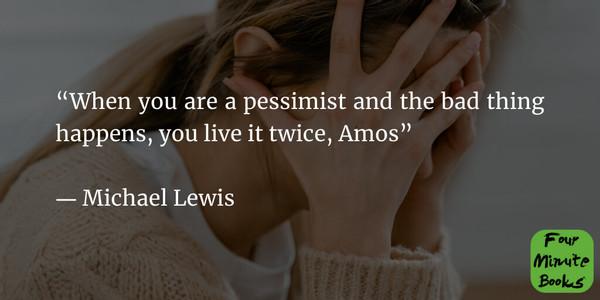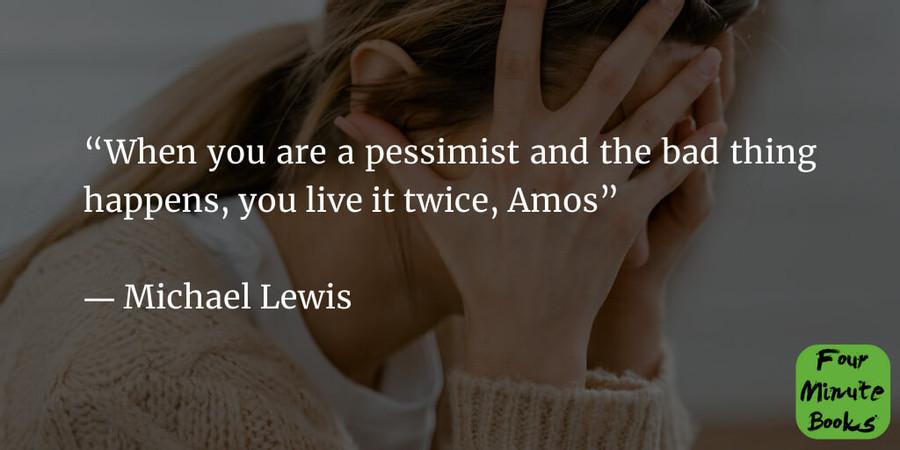The Undoing Project Summary
Curated from: fourminutebooks.com
Ideas, facts & insights covering these topics:
16 ideas
·7.6K reads
23
2
Explore the World's Best Ideas
Join today and uncover 100+ curated journeys from 50+ topics. Unlock access to our mobile app with extensive features.
The Undoing Project - Book Summ
The Undoing Project talks about the life and extensive research in the psychology of Kahneman and Tversky by bringing forth some of the most influential and groundbreaking discoveries they unveiled about human behavior and the biases in our decisions.
39
967 reads
Author Quote
"When you are a pessimist and the bad thing happens, you live it twice, Amos"
-Michael Lewis
46
990 reads
Book Overview
The Undoing Project is a book that details the lives of two highly influential psychologists, namely Daniel Kahneman and Amos Tversky. The two were working together in Jerusalem when they discovered that their work had implications for economics, medicine, law, politics, and other domains of human inquiry.
They were interested in exploring how people made decisions rather than just describing them. They set out to understand why people make errors in judgment and how they can be helped to avoid such errors.
37
588 reads
3 Top Book Lessons
Here are three of the most important lessons from the book:
- The human mind is not as logical as we think it is.
- Kahneman and Amos discovered the secrets of a great partnership, and it all starts with a common purpose.
- The most common biases are something we all have and they’re pretty hard to locate and interpret.
Time to dig deeper into these lessons and see what they can teach us about life and relationships.
40
536 reads
Lesson 1: Humans make biased decisions most of the time .
In the book, Daniel Kahneman provides many examples of how heuristics can lead to irrational behavior or bias, which are things we all experience from time to time but may not realize at first glance.
That’s because most of our decisions are based on previous experiences, our views of the world, and other implications. In a way, it’s as if we’re never actually making objective decisions, but rather building on previous experiences.
41
531 reads
Up until the 1950s, the general opinion was that people are rational beings who make rational decisions. They have laws, rules, customs, and institutions in place to help them decide what’s good and bad.
It wasn’t till Kahneman and Amos first introduced the term “cognitive bias ” that people started paying attention to how personal heuristics can affect the decision-making process. People are born into a life with limited resources, time, information, and scarce resources.
42
404 reads
Given these circumstances, their decisions must be fast and assure survival, which is why we’re wired to react in a way that makes sense to our brains. In the decision-making process , such variables can significantly alter the fairness and objectiveness of an outcome.
38
401 reads
Lesson 2: A good partnership takes mutual fueling, a common purpose, and a drive to succeed .
Amos and Kahneman were the writers of the masterpiece that laid the foundation of modern psychology. Their work influenced areas like economics, finance, sports, behavioral psychology, and many more.
What got them to the highest highs wasn’t just a shared purpose, but a common drive to see each other succeed. In fact, when the paper was done, they flipped the coin to decide whose name will appear first in the author’s box.
41
387 reads
Amos won, but he gave up the first spot for Kahneman. This shows that their partnership went beyond just work. In the process of writing, they shared one typewriter and wrote everything together in a literal way. Their great collaboration took off from shared interests and an authentic friendship.
Therefore, they managed to uncover groundbreaking discoveries about the human mind . They came up with the idea of heuristics and biases that alter the decision-making process. They also categorized these biases and paved the way for modern psychology to evolve.
39
333 reads
Lesson 3: Some of the biases discovered by the two psychologists changed industries forever .
Kahneman and Amos worked together to discover how heuristics and biases affect the decision-making process in the human mind. What they came across changed the world for many reasons.
Industries like advertising, economics, finance, and many others learned how the mind works and how to better target their efforts. Psychologists learned how to effectively spot and treat people, while anyone who’s learned about these biases improved their interactions with others and learned more about their own biases.
39
335 reads
Some Of The Most Popular Biases Identified In The Study Were:
- The confirmation bias – we look for information that supports our initial point of view and overlook information that contradicts it
- The recency bias – we think of recent or impactful events to be truer than any other answer our brain can provide because they’re easier to turn to
- The anchoring bias – we rely heavily on the first piece of information received on a given topic, and less on any additional information
- The cognitive dissonance – we refuse to plan for things that never occurred or are unlikely to happen (E.g. earthquake)
52
362 reads
The truth is, when we’re making decisions and coming to conclusions about the world around us, we’re not always doing so in a completely objective way. Instead, our biases color the way that we see things—and they also shape how we interact with others.
This isn’t necessarily a bad thing! In fact, it’s actually a key part of our ability to navigate social situations. However, you need to understand your biases.
This way, you can be aware of them to make more intentional choices about how you interact with others and make decisions about the world around you.
40
283 reads
The Undoing Project - Book Review
Many people have heard of behavioral psychology, but not many know where it came from or how it all began. The Undoing Project gives us a detailed history lesson on how these two men met at university in Israel, their work together to develop heuristics and biases, and details about their friendship and collaboration
39
280 reads
There are many lessons from this story that can be applied to our everyday lives today: how we make decisions and what drives those decisions; how important it is for us as individuals to understand ourselves better so we can understand others better; how difficult life can be for those who suffer from mental illness, and many more.
38
256 reads
Who would I recommend The Undoing Project to?
The 30-year-old person who is passionate about psychology and human behavior, the 27-year-old consumer behavior specialist who wants to deepen their knowledge, or the 40-year-old lecturer who enjoys a good read outside their usual curricula.
38
366 reads
IDEAS CURATED BY
CURATOR'S NOTE
The Undoing Project - Book Summary
“
Tom Joad's ideas are part of this journey:
Learn more about psychology with this collection
Conducting effective interviews
Identifying the right candidates for the job
Creating a positive candidate experience
Related collections
Similar ideas
Read & Learn
20x Faster
without
deepstash
with
deepstash
with
deepstash
Personalized microlearning
—
100+ Learning Journeys
—
Access to 200,000+ ideas
—
Access to the mobile app
—
Unlimited idea saving
—
—
Unlimited history
—
—
Unlimited listening to ideas
—
—
Downloading & offline access
—
—
Supercharge your mind with one idea per day
Enter your email and spend 1 minute every day to learn something new.
I agree to receive email updates

